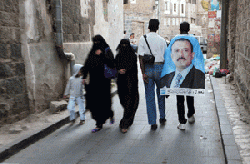In less than one week, Yemenis will go to the voting booth in the first time in decades to approve Vice President Abd Rabu Mansour Hadi as the consensus president of Yemen, something longtime ruler of Yemen Ali Abdallah Saleh is finding hard to stomach.

|
| A man carries a poster of outgoing Yemeni President Ali Abdullah Saleh, as he walks along an alley in the old city of Sanaa February 15, 2012. REUTERS/Mohamed al-Sayaghi |
It will not be easy for the man who ruled Yemen for 33 years to see a nominal vice president turn overnight into the president of the country when the polls open on February 21.
Ali Abdallah Saleh was forced to relinquish power under international pressure and after receiving immunity from prosecution for crimes he committed throughout his reign. These crimes included the killing of the non-violent activists taking part in the uprising in Yemen.
However, it does not appear as if Saleh has completely handed over power.
Saleh says that he will return to Yemen before the presidential elections to take part in inaugurating his deputy, Hadi, as president.
Those who know Saleh sense that he is intent on doing something to disrupt preparations for the upcoming elections. They say he will not allow the process to reach a successful end and give someone else the opportunity to enter the presidential palace.
Given the history Saleh’s political maneuvering, one can expect anything to happen in the short period left before Yemenis go to the polling stations. Some fear that recent unsettling developments around the country are an indication of Saleh’s “last stand.” These include an unprecedented wave of lawlessness in some major Yemeni cities like Taiz, Sanaa, and Aden.
There is a large presence of armed men in civilian clothes who are terrorizing residents and looting their belongings. Saleh says that he will return to Yemen before the presidential elections to take part in inaugurating his deputy, Hadi, as president. In addition, there are widespread rumors among Yemenis alleging that there is no need to vote on February 21 to elect a new president because there is only one consensual candidate according to the terms of the Gulf initiative.
An informed security source, who preferred to remain anonymous, said that this is likely a ruse by security personnel to limit what is expected to be a high turnout on election day.
The source told Al-Akhbar that the idea is to “show Hadi as an unpopular person in Yemen, which means that the issue, if looked at from the flip side, is nothing but a referendum on Saleh’s popularity. If there is not a large turnout, this will indicate that Yemenis still want him as their president.”
After the official announcement last Tuesday of the nomination of Hadi for president, huge posters of the only consensus candidate appeared in the streets of Yemeni cities. Shortly thereafter, even larger posters appeared of Saleh, with his deputy Hadi next to him.
People initially did not understand why Saleh’s picture was being plastered everywhere, especially in the southern half of the capital Sanaa, which falls under the control of Saleh’s son, Ahmad.
What does Saleh’s picture have to do with Hadi’s campaign?
There are widespread rumors among Yemenis alleging that there is no need to vote on February 21 to elect a new president.Political analyst Ahmad al-Baileh says the issue is nothing more than a last-ditch effort by Saleh’s supporters to show that their leader is still the real president of the country. He also contends that they are sending a message that all the preparations going on to elect another Yemeni president would not have happened without Saleh’s consent and blessing.
Al-Baileh told Al-Akhbar that this is likely the reason that these posters were hung considering the cost of printing and hanging them was not covered by the Supreme Commission for Elections or the general body for raising awareness in charge of Hadi’s campaign.
Journalist Abed al-Hakim Hilal, editor of al-Masdar newspaper, says the reason for putting up these pictures of Saleh and Hadi together is to show that Hadi is still a subordinate of Saleh.
This act can be interpreted, according to Hilal, as an attempt to link Hadi with Saleh’s tarnished history. This would constitute a major blow for Hadi and “would lead voters to refrain from going to the polls to vote.”
Khaled Abdel Hadi, a journalist at the Yemeni Socialist Party’s daily al-Thawri, said the decision to put up pictures of Saleh and Hadi together was a personal initiative on the part of businessmen and powerful figures in Saleh’s ruling party.
Abdel Hadi noted that these pictures, in addition to the advertisements broadcast on official Yemeni TV, open with statements that emphasize Saleh’s role in the transition process. The statements claim that Saleh is “the man who allowed this democratic process to take place and was its primary sponsor in the country.”
In the end, the outcome of the election is uncertain. Saleh has the ability, as he has on every decisive occasion in the history of his rule, to pull new cards out of his pocket and turn the entire political scene upside down.






Leave a Reply